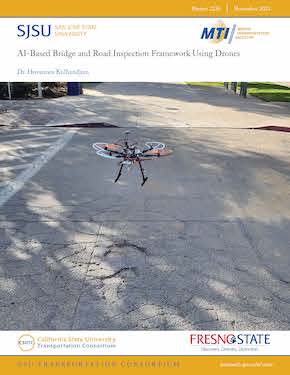- 408-924-7560
- mineta-institute@sjsu.edu
- Donate
AI-Based Bridge and Road Inspection Framework Using Drones
There are over 590,000 bridges dispersed across the roadway network that stretches across the United States alone. Each bridge with a length of 20 feet or greater must be inspected at least once every 24 months, according to the Federal Highway Act (FHWA) of 1968. This research developed an artificial intelligence (AI)-based framework for bridge and road inspection using drones with multiple sensors collecting capabilities. It is not sufficient to conduct inspections of bridges and roads using cameras alone, so the research team utilized an infrared (IR) camera along with a high-resolution optical camera. In many instances, the IR camera can provide more details to the interior structural damages of a bridge or a road surface than an optical camera, which is more suitable for inspecting damages on the surface of a bridge or a road. In addition, the drone inspection system is equipped with a minicomputer that runs Machine Learning algorithms. These algorithms enable autonomous drone navigation, image capture of the bridge or road structure, and analysis of the images. Whenever any damage is detected, the location coordinates are saved. Thus, the drone can self-operate and carry out the inspection process using advanced AI algorithms developed by the research team. The experimental results reveal the system can detect potholes with an average accuracy of 84.62% using the visible light camera and 95.12% using a thermal camera. This developed bridge and road inspection framework can save time, money, and lives by automating and having drones conduct major inspection operations in place of humans.
HOVANNES KULHANDJIAN, PHD
Dr. Hovannes Kulhandjian is an Associate Professor in the Department of Electrical and Computer Engineering at California State University, Fresno (Fresno State). He joined Fresno State in Fall 2015 as a tenure-track faculty member. Before that, he was an Associate Research Engineer in the Department of Electrical and Computer Engineering at Northeastern University. He received his B.S. degree in Electronics Engineering with high honors from the American University in Cairo (AUC) in 2008, and his MS and PhD degrees in Electrical Engineering from the State University of New York at Buffalo in 2010 and 2014, respectively. His current research interests are in applied machine learning, autonomous vehicle navigation, wireless communications, and networking, with applications to underwater and visible light communications and networking geared towards Intelligent Transpiration Systems (ITS).
Dr. Kulhandjian has received five research grants from Fresno State Transportation Institute (FSTI), and he also received the Claude C. Laval III Award for Commercialization of Research, Innovation, and Creativity 2021 as well as the Claude C. Laval Award for Innovative Technology and Research 2020 at Fresno State. In April 2021, as a Principal Investigator (PI), he received a grant from the Department of Defense (DOD) Research and Education Program for Historically Black Colleges and Universities and Minority-Serving Institutions (HBCU/MI) Equipment/In-strumentation, to establish a “Secure Communications and Embedded Systems Laboratory at California State University, Fresno".
Dr. Kulhandjian is an active member of the Association for Computing Machinery (ACM) and the Institute of Electrical and Electronics Engineers (IEEE). He is a Senior Member of IEEE. He is serving as a Guest Editor for a Special Issue "Advances in Intelligent Transportation Systems (ITS)". He has served as a Guest Editor for the IEEE Access Special Section Journal, Session Co-Chair for the IEEE UComms’20 Conference, Session Chair for the ACM WUWNet’19 Conference, and Publicity Co-Chair for the IEEE BlackSeaCom Conference. He also serves as a member of the Technical Program Committee (TCP) for ACM and IEEE Conferences such as GLOBECOM 2022, WTS 2022, WD 2021, WD 2018, ICC 2018, WUWNet 2020, and WiMob2019. He is a recipient of the Outstanding Reviewer Award from ELSEVIER Ad Hoc Networks and ELSEVIER Computer Networks.
-
Contact Us
San José State University One Washington Square, San Jose, CA 95192 Phone: 408-924-7560 Email: mineta-institute@sjsu.edu






